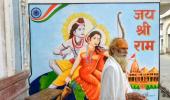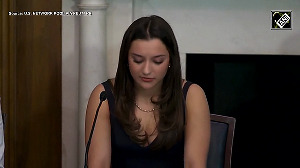The Bombay high court on Sunday dismissed a public interest litigation (PIL) filed by four students against the Maharashtra government's decision declaring a public holiday on January 22, on the occasion of the Ram temple consecration ceremony in Ayodhya.

A bench of Justices Girish Kulkarni and Neela Gokhale, which held a special hearing on Sunday for the public interest litigation (PIL) filed by four law students from Maharashtra and Gujarat, noted the petition was 'politically motivated, frivolous and vexatious'.
The HC advised the students to 'utilise their time in doing better things'.
The bench said normally the court while dismissing such a petition would impose an exemplary cost on the petitioner, but it was refraining from doing so as the petitioners here are young students and hence a word of caution would suffice.
The Maharashtra government argued that to declare a holiday falls within the executive policy decision of the government and should not fall for judicial scrutiny.
The students in their plea claimed the decision to declare a public holiday keeping an eye over the upcoming parliamentary elections was a 'gross abuse of power for political purposes'.
The petition, filed by Shivangi Agarwal, Satyajeet Salve, Vedant Agarwal and Khushi Bangia, sought that the HC quash the government order declaring a holiday on January 22.
'The petition has political overtones and it appears to be a petition that is politically motivated and a publicity interest litigation. A glare for publicity seems to be apparent from the tenor of the petition and the arguments made in the open court,' the bench said.
The court said the petitioners have also questioned the wisdom of the Supreme Court in an order passed in another matter and this has shaken 'our judicial conscience'.
'We have no doubt that this PIL has been filed for extraneous reasons. It appears to be absolutely frivolous and vexatious and does not deserve the attention of court,' the bench said.
There was no doubt that such petitions were a 'blatant abuse of law' and cannot be kept pending, it added.
The court also questioned the political remarks made in the plea and asked at whose instance or motivation the statements were included in the petition.
'As pointed out by the respondent (Maharashtra government), there are some statements about political agenda in the plea that are political in nature...some are very reckless statements. On whose motivation or at whose instance have those statements been included in the plea?' the bench asked.
The HC also questioned the petitioners as to how the media came to know of the petition even before it was placed before the court.
The petition said the consecration of a temple is an essential religious practice associated with the Hindu religion and therefore cannot be in any manner a concern of the government.
Any step taken by the government including declaration of public holiday for celebrating the consecration of a Hindu temple is nothing but an act of identifying with a particular religion, the plea claimed.
'An act of the government in celebrating and openly participating in the consecration of a Hindu temple thereby associating with a particular religion is nothing but a direct attack on the principles of secularism,' the PIL further claimed.
Such a public holiday could be declared perhaps to commemorate a patriotic personality or historic figure but not to celebrate the consecration of a temple to appease a particular section of the society or religious community, it said.
The plea said there are several temples across India and if the government starts celebrating consecrations of various Gods and Goddesses in old or newly constructed temples, it would be necessary to declare a public holiday on each of such days.
'There are only 365 days in the year and they may not be enough to celebrate such consecrations,' it said.
Public holidays would lead to loss of education if the educational institutions are closed, financial loss if banking institutions are closed, and loss of governance and public works if government and public offices are closed, it added.
Advocate General Birendra Saraf, appearing for the Maharashtra government, on Sunday argued that to declare a holiday falls within the executive policy decision of the government and should not fall for judicial scrutiny.
"The petition proceeds on a wrong footing that the decision was arbitrary. Most of the public holidays are for religious events. This allows citizens to carry out their religious practices. And such holidays are not declared for only one community. It is done for all religious communities," Saraf said.











 © 2025
© 2025